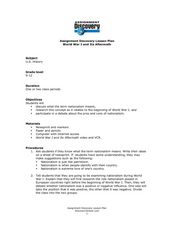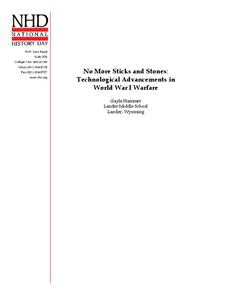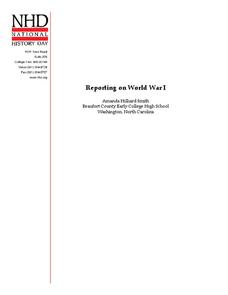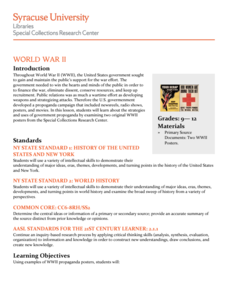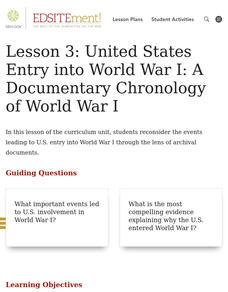Curated OER
The First World War
Students examine the process and effects of World War I on different segments of the population, beyond the political, diplomatic and military framework of the war. They analyze the memoirs of soldiers, read poetry of the time, and...
Curated OER
African Americans in World War II: Staging a Double V Campaign in the Classroom
The feelings and attitudes of African-Americans during World War II are examined by high schoolers. After watching various clips from "The War," they answer comprehension questions for each section. In groups, they create their own...
Smithsonian Institution
The Soldier’s Experience—Vietnam versus World War I
The Vietnam War and World War I were two very important—and different—wars. To understand the differences, and similarities, class members watch videos, examine primary source documents, and then create a newscast that examines the...
Curated OER
World War I and Its Aftermath
Students examine World War I and its consequences. In this World War I lesson, students watch the Discovery video "World War I and Its Aftermath." Students then research how nationalism contributed to the spread of the war...
Curated OER
African-American Soldiers in World War I: The 92nd and 93rd Divisions
Students research the role played and contributions made by African American soldiers during World War I. They discuss the evolution of civil rights in America's history, and the progress that has been made in the last 100 years.
Curated OER
Tejana Military Members in World War II
Seventh graders discover who the Tejanas were and how they contributed to World War II. In this World War II lesson, 7th graders listen to their instructor discuss who the Tejanas were prior to researching the contributions of three of...
Curated OER
Learning From World War II and Connecting It to the Present
Compare and contrast World War II to the modern Iraq war with this instructional activity. After watching a film, learners use supporting evidence to support their point of view of the conflicts. Using the internet, they create a...
Curated OER
World War II - Memory Book
Eighth graders read about and reflect upon a variety of events that occurred during World War II. They conduct research on the Holocaust and Anne Frank's life, the attack on Pearl Harbor, American life during this time and the bombing of...
National History Day
Helping Life and Aiding Death: Science, Technology, and Engineering at Work during World War I
Science, engineering, and United States history? Pupils research collections of artifacts from the Smithsonian to learn about historical scientific innovations. At the end of the lesson, they write an essay to discuss technology's...
National History Day
Why Did the United States Enter World War I in 1917?
World War I was the first major conflict on a global scale. Using primary documents, learners determine why the United States chose to enter World War I when it did. After analytical writing and group research, the causes of America's...
Syracuse University
World War I
World War I was known for its gruesome battlefields and horrific injuries. Using photographs from a battlefield surgeon's scrapbook, scholars see first-hand what life was like in the trenches. After creating a timeline of the war using...
National History Day
Challenging the Status Quo: Women in the World War I Military
Why are some so resistant to change? The status quo is often to blame for a lack of forward movement in society. Following the events of World War I, women in America suddenly had a voice—and were going to use it. Scholars use the second...
Curated OER
United States Entry into World War I: A Documentary Chronology of World War I
High schoolers identify several important events that led to U.S. involvement in World War I. They examine different explanations, form an opinion about the evidence for each rationale and then create a slideshow to present their findings.
National History Day
No More Sticks and Stones: Technological Advancements in World War I Warfare
Remind young historians that many technological advancements influenced the events of World War I. After analyzing technology's evolution through primary sources, discussing the changes over time, and watching various video clips,...
National History Day
Propaganda Posters of World War I: Analyzing the Methods Behind the Images
The power of a picture. During the events surrounding World War I, propaganda posters were widely distributed in American society to sway the emotions of its citizens. By analyzing World War I propaganda posters in the first installment...
A&E Television
The World Wars
Contemporaneously known as The Great War, World War I had never seen its match on the global stage—until World War II. An engaging set of resources designed to extend a viewing of the History Channel's The World Wars features discussion...
National History Day
“Saving the Bear”: The Russian Expeditionary Force of World War One
How have Russian politics affected countries on a global stage? The discussion of the Russian Revolution and World War I begins with an analysis of primary resource letters. Learners finish with a project where they create a timeline of...
National History Day
Reporting on World War I
Throughout history, newspapers have reported the events of the day as they unfolded. Using primary and secondary sources from World War I, scholars uncover how the American people learned of the events of the War to End All Wars. History...
Syracuse University
World War II
During World War II propaganda was as important to the war effort as the soldiers in the field. Scholars consider how the government communicated messages of patriotism with propaganda by examining pieces from World War II. Then, they...
National Endowment for the Humanities
Fly Girls: Women Aviators in World War II
Explore contributions of Women Airforce Service Pilots (WASPs) during World War II with an engaging history lesson. Middle schoolers examine portrayals of women in World War II posters and newsreels, compare and contrast them with...
Curated OER
United States Entry into World War I: A Documentary Chronology of World War I
Eleventh graders reconsider the events leading to U.S. entry into World War I through the lens of archival documents.
Curated OER
World War II: The Pacific
High schoolers explore the events in the pacific during World War II. In this World War II instructional activity, students use reference material to access information about significant locations in the War. Student debate the use of...
Curated OER
Wilson and American Entry into World War I
Students explore the events that led to American entry into World War I. In this American history lesson, students examine the policies of Woodrow Wilson at the dawn of the war, analyze challenges to the neutrality policy of the U.S.,...
National WWII Museum
Women and the War: Supporting Historical Interpretations
Rosie the Riveter may be an iconic image from World War II, but not all historians agree on how the conflict affected women in the workplace. Individuals evaluate the writings of well-known historians on the topic, and then decide: Was...





